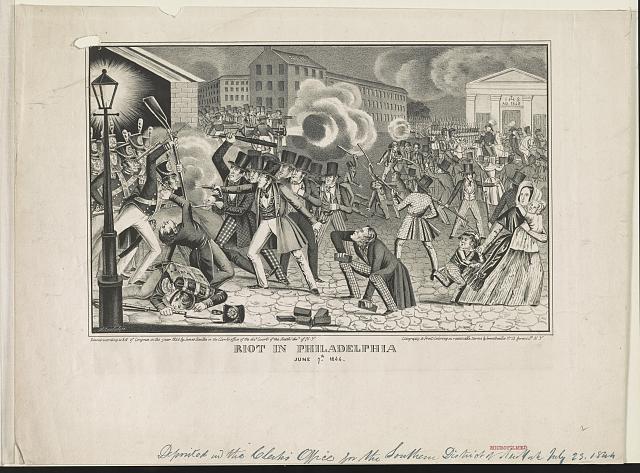Part of what makes doing history so exciting is that the questions and interpretive challenges never really end. In the process of tackling one question, a new one always emerges. Such is the case with my work, as I have been reviewing both archival materials and oral history conducted over the past year or so. The question I’m confronting at the moment is: what happens when political principles and philosophical ideals clash with practical exigencies and the realities of people’s everyday struggles?
My project explores the roots and consequences of Mexican Americans’ changing attitudes toward the undocumented, in an attempt to understand how a previously ambivalent—even hostile—position evolved into the belief that all ethnic Mexicans formed “one people without borders.” Although my preliminary findings and hypothesis would require a much longer treatment than is possible here, it is clear that by the 1980s, most Mexican Americans, whether they called themselves Chicanos or not, felt a strong affinity for immigrants and sympathized with their struggles.
Mexican American leaders, however, often responded to immigration reform proposals with indignation and distrust, even when these proposals included amnesty provisions, as did the failed Carter immigration plan and later, the Simpson-Mazzoli Act, which Ronald Reagan signed into law as the Immigration Reform and Control Act of 1986. In his signing statement, the president said he hoped the law would “go far to improve the lives of a class of individuals who now must hide in the shadows, without access to many of the benefits of a free and open society.”
But leading Mexican Americans, including Bert Corona—generally acknowledged as the father of the immigrant rights movement—and his mentee Herman Baca, among countless other ethnic and labor leaders, consistently rejected such immigration legislation. The reasons were many, but generally they feared such proposals could lead to discrimination on the job and open the door to a new bracero program (the widely despised guest worker program that imported nearly four million workers from Mexico between 1942 and 1964). Furthermore, they argued that the very premise of amnesty criminalized immigrants and their desire to earn an honest living. Whereas the former two problems were of practical concern, some leaders viewed the latter as particularly insulting because it fundamentally denied the dignity of undocumented workers.
But for immigrants themselves, amnesty was hardly an insult. Unlike Herman Baca, who one year after IRCA was signed into law called it “the biggest failure since Prohibition and the 55 mile speed limit,” immigrants received the law enthusiastically and with great relief. Life without documents was, after all, a miserable proposition. As one immigrant I interviewed put it, “The law in those years [the 1970s] was very hard on us.” During one particularly harsh summer, Eliseo Murillo remembers, undocumented workers could not even sleep in their barracks-style camps because immigration raids at night had become so common. “We slept deep in the vineyards, on the ground, with water running down both sides,” the now elderly worker remembers. Another immigrant recalls the immediate impact the law had on him: “it was like a blindfold was taken off my eyes,” he told me. “I stopped living in fear of deportation. I was at peace, and my life became a happy and peaceful one.”
For everyone who benefitted from IRCA, the law was life-changing, but for some, amnesty was literally life-saving. Abel Guzman, who, along with three million others, had lived and worked in the United States for some time before receiving amnesty in 1986, was diagnosed some years later with kidney failure. As a legal resident and later a citizen, he was able to apply for and receive Medicare benefits. “There are people in Mexico with my same condition,” he told me, “but they don’t live as long as I’ve lived. I’ve had this problem for 20 years, I’ve been getting dialysis for 20 years, and yes, I’ve struggled, but here I am. There are people in Mexico who get this and can expect to live no more than a few months, especially the poor who don’t have access to good health care.”
The contrast between the archival materials, usually reflecting the views of institutional, ideologically driven leaders, and the oral testimony of formerly undocumented workers, who were more concerned with relief from the difficulties of undocumented life, poses numerous interpretive challenges, but it also reveals how much has changed, no doubt partly as a result of immigrants and their families engaging with ethnic and political leaders and articulating what they need and expect of those who claim to represent them. Today’s activists, which include a million DREAMers, generally frame amnesty (even when they don’t use the term) as a necessary step to providing undocumented people a dignified presence, not as an assault on it.
Looking at this past, then, provides valuable lessons for both historians and activists, none more crucial than the importance of listening to the voices and testimonies of ordinary people. Their lived experiences and memories can help us make better sense of a complicated past, one in which movement leaders genuinely hoped to improve the lives of ethnic Mexicans, but whose radical politics did not always coincide with the everyday needs of those who needed reform most. Undocumented people yearned not for some grand political revolution, but for something more modest: a legal status that allowed them to live, work, and raise their families in the United States, in a dignified way, and as President Reagan promised, out of the shadows.
This post first appeared on AHA Today.
This work is licensed under a Creative Commons Attribution-NonCommercial-NoDerivatives 4.0 International License. Attribution must provide author name, article title, Perspectives on History, date of publication, and a link to this page. This license applies only to the article, not to text or images used here by permission.

